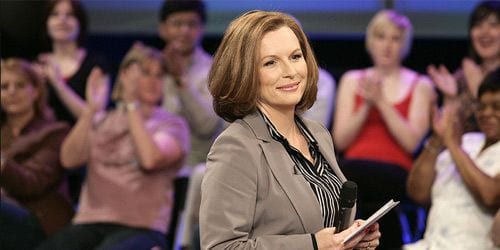
The Life and Times of Vivienne Vyle is a satirical commentary on sleazy daytime talk-show television, the modern version of the age-old obsession with fame, status and success, and the cult of one’s own perceived celebrity. It stars Jennifer Saunders (French and Saunders, Absolutely Fabulous) in the title role of a controversial host famous for finding and exploiting her guests’ sensational faults. She’s a woman driven primarily by her out-sized ego and nursing many not-so-hidden faults of her own.
Her life-partner, played by Conleth Hill, is a gay man who’s not even really pretending to be her heterosexual husband. Jason Watkins plays Dr. Jonathan Fowler, a psychotherapist hired by the show to counsel guests and to keep Viv from going too far, and he’s clearly also meant to fulfill the role of the sane one among the loonies. The main cast is rounded out by a magnificent Miranda Richardson (Tom & Viv, Harry Potter and The Goblet of Fire), who nearly steals the show from Saunders in all her scenes as Vyle’s equally driven, and manically priority-challenged, producer, Helena De Wend.
Vivienne Vyle is so much darker than Saunders other works, and the humor is inkier than even most comparable comedies (say, the original British series of The Office), that it is sometimes difficult to even tell it is meant to be comedy. The performances are excellent and the story-lines can be engrossing, and while those are the very things that make good television worth viewing, they are also the things that often make each of these six episodes a bit troubling to watch.It’s as if the show hits a little too close to home, with the characters all so self-involved (Helena’s child is constantly in the care of a nanny, and as a result can’t speak English and doesn’t recognize her mother) and everyone communicating only through technology (Vivienne and Jared have a video phone as the centerpiece of their opulent home, Helena constantly screams mispronounced Spanish down the phone to her home from the office she seems to rarely leave).
Because the series is about a TV show, it also shines its less-than-flattering satirical spotlight on the tragedy that is the state of current viewing tastes.The Vivienne Vyle Show is equal parts reality show and publicity stunt, with Vyle baiting her pathetic and disturbed guests on-air (exposing unfaithful spouses and exploiting terminally ill children) and inviting the lowest common denominator to come forward during the credits at the close of her show.
Sometimes, this bit is mildly funny (“What turns you on? Is it fantasy or fetish? Is it feathers or fisting? Is bondage holding your marriage together? … Dominatrix or slave, we want to hear from you. I’ll be cracking the whip on the Vivienne Vyle week-long special: ‘What tickles your fancy?’ Contact us…”), while other times it’s just sad (as when she asks for volunteers who would like to marry their siblings to appear for her week on “Incest”).
Each episode does have its brilliant moments, mostly found in the knack Saunders has for hilarious facial expressions, or in Richardson’s fearlessly loose physical comedy. The final episode here, however, is by far the best for another reason entirely. It’s the funniest because it seems to consciously include more actual comedy, both broad and subtle.
The opening scene displays this instantly with Vivienne and Jared getting ready for their day in a blissfully compatible and choreographed manner. It’s literally a song-and-dance number to “Islands in the Stream”, with Jared in the Dolly Parton role. At The Vivienne Vyle Show, Helena (whose nanny is, of course, being deported) announces that the next show will be completely live. “No delays, no edits, no buttons,” and that means, “No swearing!” This sets up what is sure to be chaos later on.
Meanwhile at home, Jared answers the door to find a gossip columnist threatening to expose the fact that Jared was present at a party where an underage rent boy suspiciously fell to his death from a balcony. The subjects are all obviously still very dark, but somehow in this episode it works because it finally has enough obvious laughs to balance out.
Where the previous five episodes erred on the side of bleak satire to the point of uncomfortableness, this last one stops just short of grim, in that grey area where genuine, universally accessible comedy can be found. Of course, that doesn’t mean it can’t still be smart and satirizing, it’s just that comedy—even the black, spiteful, social commentary variety—is meant to lift you as it entertains.
Unfortunately this, for the most part, is anything but uplifting. Not that the first five episodes aren’t worth watching (they are, but it’s not for light laughs), but it’s a shame it took until the last one of this series for The Life and Times of Vivienne Vyle to find its comic stride.
